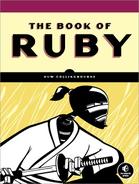Some Ruby programmers have very fixed—or even obsessive—views on what constitutes a “Ruby style” of programming. Some, for example, are passionately wedded to the idea that method_names_use_underscores while variableNamesDoNot. The style of naming in which separate words are indicated by capital letters likeThis is called camel case—and that is the last time it will be mentioned in this book.
I have never understood why people get so worked up about naming conventions. You like underscores, I can’t stand them; you say po_ta_toes, I say poTaToes. As far as I am concerned, the way in which you choose to write the names of identifiers in Ruby is of no interest to anyone but you or your programming colleagues.
That is not to say that I have no opinions on programming style. On the contrary, I have very strong opinions. In my view, good programming style has nothing to do with naming conventions and everything to do with good code structure and clarity. Language elements such as parentheses, for instance, are important. Parentheses clarify code and avoid ambiguity that, in a highly dynamic language such as Ruby, can mean the difference between a program that works as you expect and one that is full of surprises (also known as bugs). For more on this, refer to the index entries on “ambiguity” and “parentheses.”
In more than two decades of programming, one thing I have learned through bitter experience is that the most important characteristics of well-written code are clarity and lack of ambiguity. Code that is easy to understand and easy to debug is also likely to be easier to maintain. If adopting certain naming conventions helps you achieve that goal, that’s fine. If not, that’s fine too. The Book of Ruby does not preach on matters of style.
